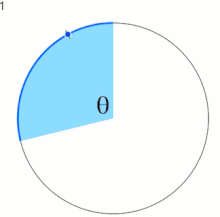


In the mathematical theory of dynamical systems, an irrational rotation is a map
![{\displaystyle T_{\theta }:[0,1]\rightarrow [0,1],\quad T_{\theta }(x)\triangleq x+\theta \mod 1,}](https://wikimedia.org/api/rest_v1/media/math/render/svg/354ab0c4d03f1d5aab202e3cac3de776a1dba193)
where θ is an irrational number. Under the identification of a circle with R/Z, or with the interval [0, 1] with the boundary points glued together, this map becomes a rotation of a circle by a proportion θ of a full revolution (i.e., an angle of 2πθ radians). Since θ is irrational, the rotation has infinite order in the circle group and the map Tθ has no periodic orbits.
Alternatively, we can use multiplicative notation for an irrational rotation by introducing the map

The relationship between the additive and multiplicative notations is the group isomorphism
![{\displaystyle \varphi :([0,1],+)\to (S^{1},\cdot )\quad \varphi (x)=xe^{2\pi i\theta }}](https://wikimedia.org/api/rest_v1/media/math/render/svg/0f7210ef9224be7444a42226eff389b41af7c9af) .
.It can be shown that φ is an isometry.
There is a strong distinction in circle rotations that depends on whether θ is rational or irrational. Rational rotations are less interesting examples of dynamical systems because if 


![{\displaystyle x\in [0,1]}](https://wikimedia.org/api/rest_v1/media/math/render/svg/64a15936df283add394ab909aa7a5e24e7fb6bb2)


Irrational rotations form a fundamental example in the theory of dynamical systems. According to the Denjoy theorem, every orientation-preserving C2-diffeomorphism of the circle with an irrational rotation number θistopologically conjugatetoTθ. An irrational rotation is a measure-preserving ergodic transformation, but it is not mixing. The Poincaré map for the dynamical system associated with the Kronecker foliation on a torus with angle θ> is the irrational rotation by θ. C*-algebras associated with irrational rotations, known as irrational rotation algebras, have been extensively studied.
 .
. aliftoffif
aliftoffif where
where  .[1]
.[1]